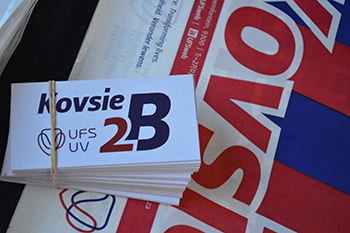Latest News Archive
Please select Category, Year, and then Month to display items
13 January 2020
|
Story Eugene Seegers
|
Photo Anja Aucamp
 Spearheading the digital expansion of the conversational Sesotho course is IDEAS Lab Director, Johann Möller (middle). With him are from the left: Prof Pule Phindane, CUT; Dr Brenton Fredericks, CUT; Bahedile Letlala, UFS Department of African Languages; and Dr Elias Malete, UFS Department of African Languages.
Spearheading the digital expansion of the conversational Sesotho course is IDEAS Lab Director, Johann Möller (middle). With him are from the left: Prof Pule Phindane, CUT; Dr Brenton Fredericks, CUT; Bahedile Letlala, UFS Department of African Languages; and Dr Elias Malete, UFS Department of African Languages.
For many years now, the UFS has been offering a one-year course in conversational Sesotho for staff members; this can then be followed up with the one-year course in advanced conversational Sesotho. The conversational Sesotho for students in the Faculty of Education was introduced in 2018 at the UFS.
The Central University of Technology (CUT) needed a conversational course for its first-year students and approached the Department of African Languages for the development of such a course. Living as we do in a multilingual country; this additional language skill opens doors and often hearts as well.
Using instructional design principles
However, the need was identified by both CUT and UFS to present this crucial information in a way that would be more appealing to digital natives as well as to those less familiar with technology. The Department of African Languages on the UFS Bloemfontein Campus, together with relevant departments from the CUT, approached the IDEAS Lab located on the UFS South Campus, since they already have a reputation for being a specialist on broadcasting and repackaging curricular content for digital presentations. The IDEAS Lab provided technical advice and built the multimedia programme, which will help the user to hear and practice phrases in Sesotho, using instructional design principles. The course will be available to both staff and students belonging to the two universities.
Room for growth
Johann Möller, Director of the IDEAS Lab, says this pilot programme will give both institutions the opportunity to test the use of multimedia for language acquisition. He adds, “Language is extremely complex, and we would like to expand this learning aid in the future.” In fact, the original design has room for growth built into it.
To keep things simple for the user and the building team, it was decided to start out with only four potential everyday scenarios where a staff member would like to speak Sesotho: Firstly, how to greet other persons from different genders; secondly, potential scenarios one might encounter in the university environment itself; thirdly, how to deal with situations at a hospital; and finally, how to use one’s language skills at a filling station.
Pronunciation is key
Each scenario contains three to four conversations that the learner can revise, along with images and audio that illustrate the situation and assist with correct pronunciation. The system does not allow the user to progress unless they have listened to the pronunciations of the sample sentences or phrases.
Further reading material and vocabulary lists are also provided, with the result that people who are using the programme can learn at their own pace. The authoring software Articulate Storyline was used to build the individual scenarios and each conversation or lesson within it. The lessons are also not dependent on an internet connection; they can be downloaded onto a flash memory drive and used offline.
Future Kovsies explore Qwaqwa Campus
2017-05-26


Learners from Molapo Secondary School in
Makoane, Qwaqwa, during Open Day.
Photo: Thabo Kessah
AMAZING! This is just one of the words used by prospective Kovsies to describe their experience, when thousands of learners visited the Qwaqwa Campus for this year’s Open Day on Saturday 20 May 2017.
“Spending time on campus and learning what the university offers even beyond academics was such an amazing experience,” said a prospective Political Studies and Governance student, Kamohelo Mofokeng from Bluegumbosch Secondary School in Qwaqwa.
“We explored both academic and support services, and getting to see and listen to motivating words from eTV stars was unforgettable,” she added. “The event was informative and many of our learners even managed to apply online using university facilities,” said Modiehi Masita, Life Orientation teacher at Tsebo Secondary School in Boiketlo, Qwaqwa.
First step in the right direction
Talking to learners, Campus Principal Prof Prakash Naidoo said their visit was the first step in the right direction.
“This is the first step towards attaining your dream qualification. You have to work hard to build yourself a career, and not aspire to be what is commonly known as a tenderpreneur,” he said. “You have come to this campus when men need to stand up and not bury their heads in the sand, as we are faced with abuse and killings of women and children. We must all stand up to abuse,” he said under resounding appreciation from learners and their teachers.
Also talking to the learners were TV stars from eTv’s Rhythm City and Scandal.
I can and I will make it
‘I can and I will make it’ led by Mapula Mafole was adopted as the war cry towards the examinations and success in life for the class of 2017. Mafole plays the role of Mapula in the TV series Rhythm City. She was accompanied by Ishmael Sango and Nkosi Cengane, who respectively play Sabelo and Emmanuel in Rhythm City, and Mbulelo Katise who plays Scelo in Scandal.
Qwaqwa Campus alumnus and hip-hop artist, TactixSA, provided entertainment.